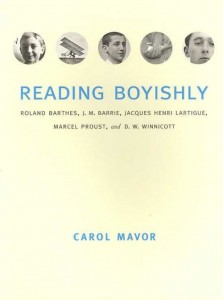 Reading Boyishly: Roland Barthes, J. M. Barrie, Jacques Henri Lartigue, Marcel Proust and D. W. Winnicott
Reading Boyishly: Roland Barthes, J. M. Barrie, Jacques Henri Lartigue, Marcel Proust and D. W. Winnicott
by Carol Mavor
Duke University Press
522 pages, $27.95
THIS BOOK is a curiosity, that’s for sure. Sprightly, witty, distinctly unlabored, at times willfully unacademic, Reading Boyishly plots its course as: “Ancient boys, aged children, adolescent gentlemen: I dish them up as boyish cuisine… My book is puerile, a depreciative term meaning merely boyish.”
Carol Mavor, a Californian and a professor of art history now based in England, has gathered five figures, loosely collected around the idea of the boy or the boyish. The French structuralist critic Roland Barthes was “boyishly” attached to his mother all his life—and sometimes secured the services of other boys. J. M. Barrie notoriously immortalized his devotion to the five brothers in Peter Pan, by some measures the most successful play ever written. Jacques Henri Lartigue was from early boyhood a photographer and celebrant of the French belle époque, capturing such subjects as well-to-do Parisian life, early attempts at flight, friends on holiday, and in general the leisurely moments that preceded World War I. Marcel Proust, of course, embarked on his great novel sequence In Search of Lost Time as a much older man, retaining in many ways the helplessness of a child or “spoiled boy” and using the boyishness of Marcel, the narrator and protagonist, to distract us from the author’s own sophistication. D. W. Winnicott was an eminent English child psychoanalyst of the 1960’s, renowned for the concept of the “good-enough mother.”






